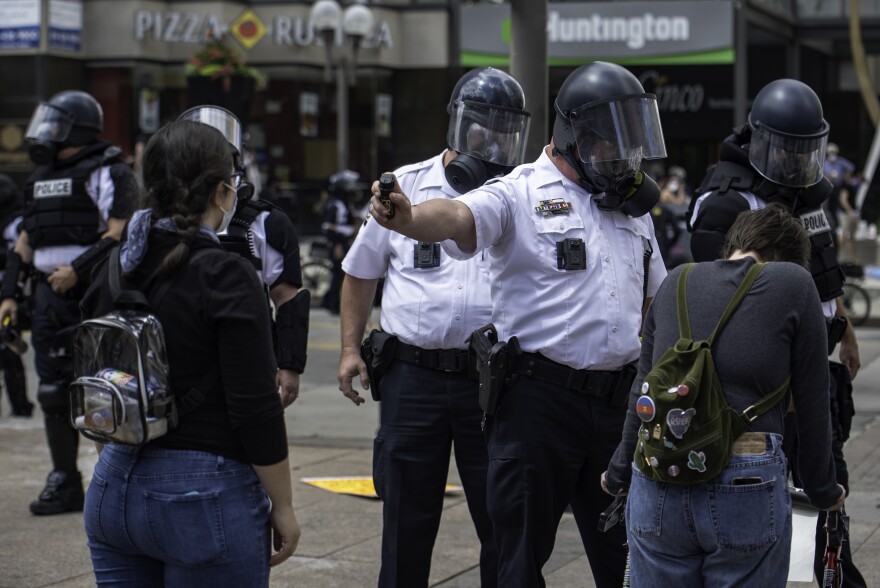Columbus will adopt a set of restrictions on police use of force known as #8CantWait, even as the campaign’s organizers insist the policies should be considered merely a first step.
As protests over police violence spread around the country, the hashtag #8CantWait began spreading on social media, referencing eight proposals for police use of force restrictions.
Speaking on Wednesday, Mayor Andrew Ginther says Columbus is already following four of them, including a ban on choke or strangleholds, requiring de-escalation, warning before firing weapon, and establishing a use of force continuum.
“Additional guidance, training and clear directives are required,” Ginther explains, “for the Columbus Division of Police to fully meet the following four standards: exhaust all alternatives before shooting, a duty to intervene, to ban shooting at moving vehicles, and to require comprehensive reporting.”
Columbus City Council President Shannon Hardin highlights the duty for officers to intervene in cases of misconduct.
“New rules will require an officer to intervene if they see another officer using excessive force, much like what failed to happen in Minneapolis when an officer killed George Floyd," Hardin said. "These are safe and sensible guidelines.”
Responsibility for drafting the specific policy language falls to City Attorney Zach Klein. He says that language is already on the desk of Columbus Police Chief Tom Quinlan.
“I believe these are straight-forward common sense and necessary policy changes,” Klein says. “They’ll work in conjunction with other important reforms that we as a city, and my office and me personally are committed to making.”
Meanwhile, in a letter posted to their website, #8CantWait organizers apologized for their proposals detracting from even more aggressive reforms. While they argue the policies are a good step toward protecting Black lives, they write that “the end goal for all of us should be absolute liberation from policing.”
"If you are from a place where #8CANTWAIT is being considered, demand steps towards defunding and abolition," the letter reads. "If you are a legislator who has adopted these policies or are considering it, please know that it will take many strategies to move beyond policing and use this time to learn more and listen to the needs of your community."
While Ginther, Hardin and Klein all say further reforms are coming, they rejected bids to abolish or defund police. Ginther insists the city is committed to reforms that will fundamentally alter the department.
“We believe police absolutely have an important role in the safety of our community,” Ginther says. “But we also need to be very clear, that policing will likely look very different than it does today, and it needs to.”
Hardin echoed that point.
“We look forward to that process of wholly reimagining what policing looks like in the city of Columbus,” Hardin says. “If it looks the same way as it does today, then we have failed.”
Ginther said Tuesday that Columbus Police will no longer be permitted to use chemical agents like tear gas or pepper spray to clear peaceful demonstrators from a street or other area.
Along with City Council, Ginther also announced the selection of 14 people to serve on a new policy advisory panel within the police chief's office. The first meeting of that panel will be in July.





